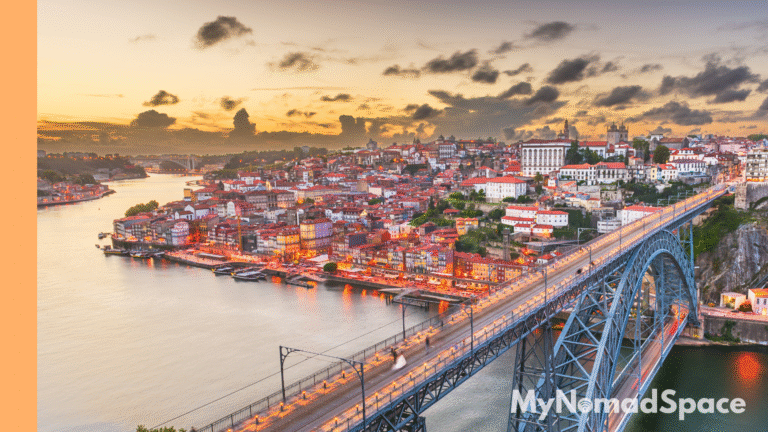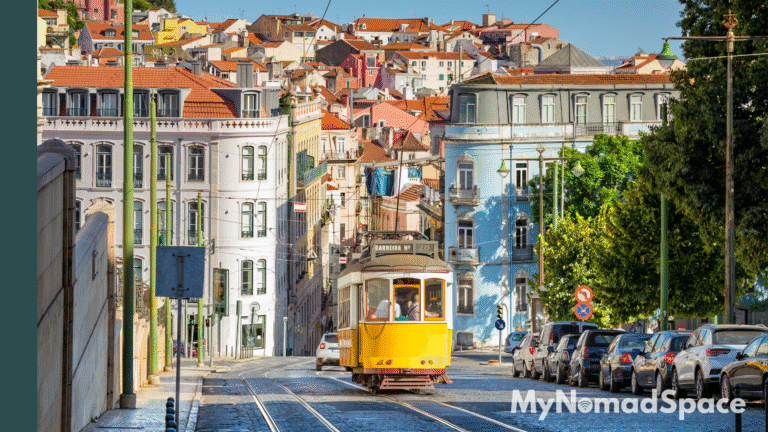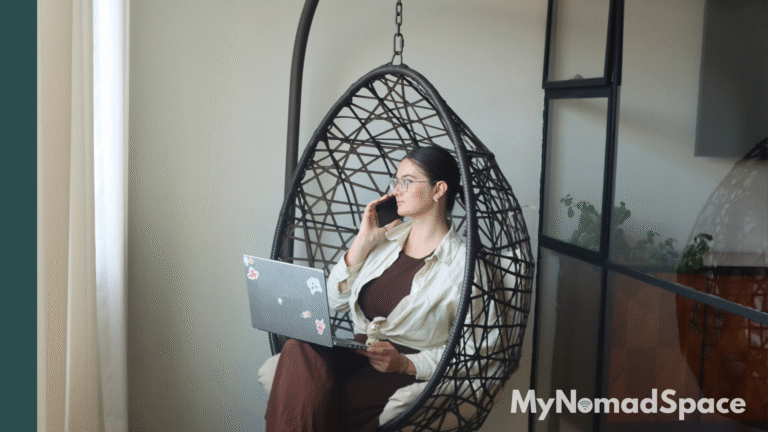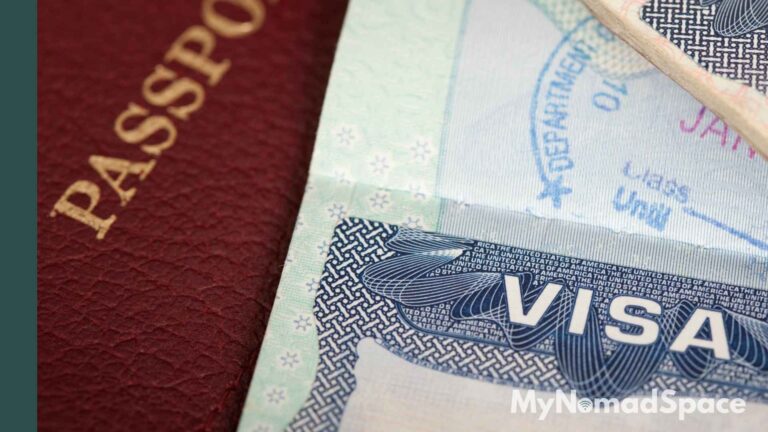Considering setting up somewhere new? Portugal might just be the place.
Portugal has quietly become one of Europe’s best spots for digital nomads looking for a slower, sunnier pace of life. And thanks to the country’s D8 Visa – officially known as the “residence visa for the exercise of professional activity provided remotely outside the national territory” (catchy name, right?) – you can now make that dream of working from cities like Lisbon or Porto a long-term reality.
Curious about how the D8 Visa works? Here’s everything you need to know to get started.
So, what exactly is the D8 Visa (Portugal's Digital Nomad Visa)?
Portugal launched the D8 visa in late 2022, giving remote workers a clear, legal way to live and work in the country. Before that, digital nomads had to make do with other types of visas, like the D7, which was more suited to people with passive income or those already planning to retire. The D8 changed all that by offering something more tailored to modern remote work life.
There are two versions of the visa. One is for shorter stays, up to 12 months, ideal if you’re just testing the waters or planning a temporary move. The other is for long-term stays, and it’s a better fit if you’re looking to stay on a more permanent basis. That version can even lead to residency and eventually citizenship if you decide Portugal’s the place you want to stick around.
Who can apply?
If you’re from outside the EU, EEA or Switzerland and you work remotely or run your own thing online, you’re likely in a good position to apply.
The rules are fairly straightforward. You need to show that your income comes from outside Portugal, that you’re earning enough to live comfortably while you’re there and that you’ve sorted a place to stay. You’ll also need a clean criminal record.
It doesn’t really matter whether you’re freelancing, working for a company abroad or running an online business. What matters is that your income is consistent and you’re not looking to work for a Portuguese employer.
What do you need to apply?
There’s a fair amount of paperwork, but it’s all pretty standard for a visa like this. You’ll need:
A valid passport with at least six months before expiry
Proof that you earn at least four times Portugal’s minimum wage – currently around €3,480/£2,980 per month
Contracts or documents showing you’re employed or self-employed, or running your own business
Recent bank statements showing regular income and enough savings (usually around €10,440/£8,940 or more)
Proof of accommodation in Portugal – this can be a rental contract, booking confirmation or invitation letter
Health insurance that covers you while you’re in Portugal
A criminal background check from your home country
A completed visa application form and passport photos
A Portuguese tax number (NIF), which you can sort out before applying
Some people choose to use an immigration lawyer to keep things straightforward, especially if they’re going for the long-stay version. But if you’re organised and don’t mind a bit of admin, you can absolutely do it yourself.

A look at the application process
You’ll kick things off at the Portuguese consulate or embassy in your home country. That’s where you apply for the initial visa that gets you into Portugal legally as a remote worker.
If you’re going for the long-stay route, this first visa is valid for four months and allows two entries into Portugal. It gives you enough time to enter the country, get settled and attend your residence permit appointment.
Once you land in Portugal, the next step is applying for your residence permit. This is what allows you to stay longer term and actually live in the country beyond just a few months.
It’s not instant, but as long as your paperwork’s in order and you follow the process, things usually move along without too many surprises – especially if you’ve dealt with visa systems before.
Step-by-step guide
Here’s how it usually goes:
Book an appointment at your local Portuguese consulate
Gather your documents – take your time with this, they don’t love mistakes
Submit your application and pay the fee (around €90/£75)
Wait for your visa (could take a few weeks, depending on where you are)
Fly to Portugal and start setting up your life
Apply for your residence permit at SEF (Portugal’s immigration office)
Get your residence card – and you’re sorted
What happens after submitting an application?
After you hand everything in, it’s mostly a waiting game. The consulate will check over your documents, maybe ask for a few extras and then either approve or deny your application.
If it’s approved, you’ll get a temporary visa that lets you enter Portugal. Once you’re in the country, you’ll make a second application to get your actual residence card. That bit happens with SEF – the immigration authority – and comes with its own appointment and processing time.
Approval time
It varies. In some places, you’ll get your visa approved in three to six weeks. Others might take a bit longer.
Once you’re in Portugal, getting your residence card can take another couple of months. So overall, give yourself 3 to 4 months to go from starting the process to having your feet on the ground and your permit in hand.
Validity and renewal
If you’re going for the short-stay version of the D8, you’ll get a visa that lets you stay in Portugal for up to 12 months. It’s great if you want to test things out without committing long-term.
If you’re applying for the longer route, things work a bit differently. First, you’re issued a four-month visa that gets you into Portugal. Once you’re there, you’ll have an appointment with AIMA (formerly SEF) to apply for your residence permit. That’s when you’ll get your two-year residence card.
You can renew it later, and after five years of legal residence, you could be eligible for permanent residency or even citizenship. So if you find yourself really settling in – the food, the coast, the slower pace – there’s a real path to make it long-term.

What about paying taxes in Portugal?
If you spend more than 183 days a year in Portugal, you’ll be considered a tax resident. That means you’ll need to register with the local tax office and start paying taxes there.
Portugal used to have the Non-Habitual Resident (NHR) scheme, which offered generous tax breaks for new residents for up to 10 years. It’s recently been phased out for most newcomers, but some transitional or replacement schemes may still apply depending on your situation. It’s definitely one to double-check before you move.
If you’re self-employed or running your own thing, Portugal’s simplified tax regime might work in your favour. It’s designed to keep things relatively straightforward for freelancers and small business owners.
That said, tax can get complicated quickly, especially if you’re earning from different countries. It’s a smart move to speak to a tax advisor who understands both Portuguese and international tax rules. They’ll help you figure out what you owe (and how to avoid paying more than you need to).
Questions?
Still working out if the D8 visa’s the right fit? That’s completely normal. It’s a big decision, and there’s a fair bit of paperwork involved. If you’re unsure about anything, it might be worth speaking to a visa specialist or immigration lawyer, especially if your situation’s a bit more complex.
And for the official word on how it all works, head to Portugal’s government visa site here. That’s where you’ll find the most up-to-date info straight from the source.
But do you even need a visa to stay in Portugal?
If you’re from the EU, you don’t need a visa at all. You’re free to move to Portugal, settle in and register locally once you’ve arrived. It’s all pretty simple.
If you’re coming from the UK, US, Canada, Australia or a handful of other countries, you can visit Portugal for up to 90 days in any 180-day period without needing a visa. That’s fine for a short trip or seeing if the country is right for you, but it doesn’t give you much time to actually get properly set up.
So if you’re planning to stay longer and make Portugal more of a home than a holiday or short-term stay, you’ll need something more solid. That’s where the D8 visa comes in. It’s designed for exactly this – letting remote workers stay legally, for longer, with the option to renew or even go down the residency route later on.
This article was updated on January 1st, 2026.








